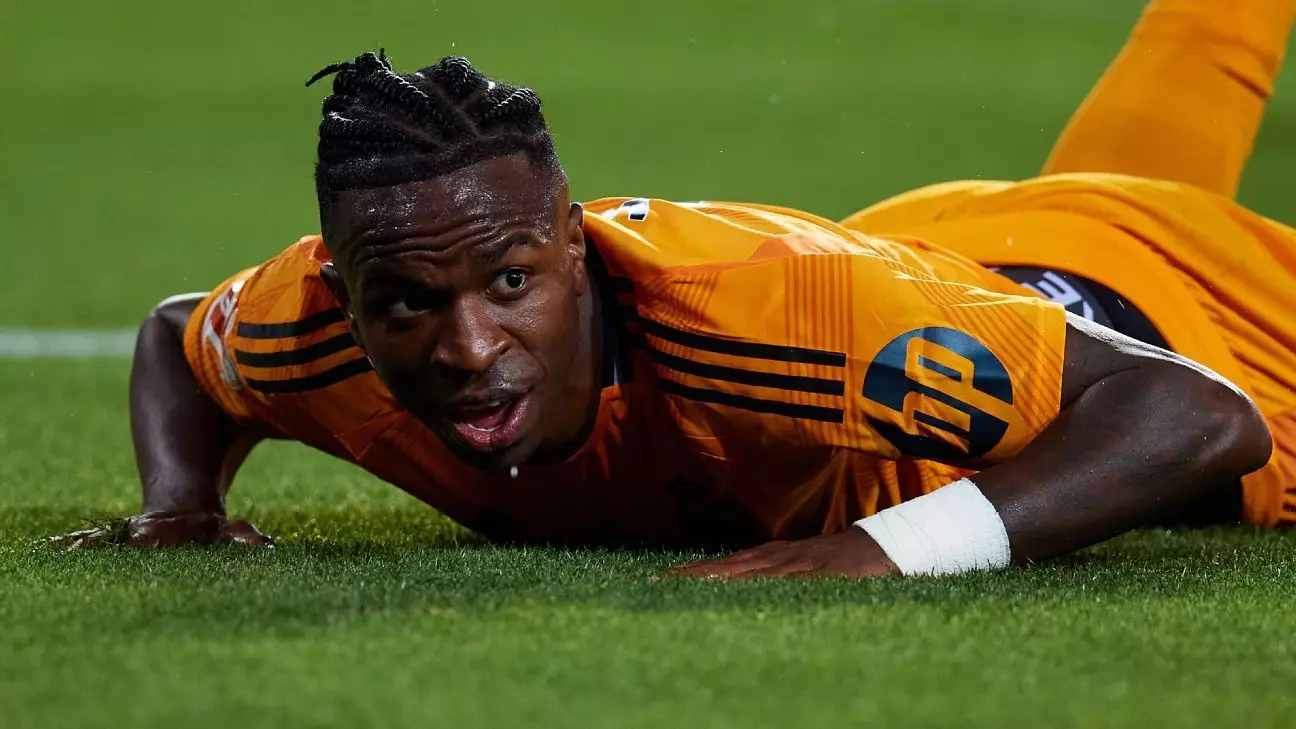The footballing world thrives on high emotions, passionate supporters, and visceral competitions. In this arena, players often face intense scrutiny, but few have been the subject of such polarized discussions as Vinicius Junior. Recent events surrounding his red card during a match against Valencia not only spotlight Vinicius’s talent and temperament but also open a dialogue about wider issues of racism and accountability within professional sports. Analyzing the ongoing discourse around him reveals a troubling reality: Vinicius’s fiery temperament is often weaponized against him, while biases rooted in cultural perceptions linger in the shadows.
A Discrepancy in Accountability
When pondering whether Vinicius deserved his recent two-game ban after being expelled against Valencia, one must consider the nature of his actions in isolation. His expulsion stemmed from an emotional reaction to provocation, contrasting sharply with the on-pitch conduct that led to many of Sergio Ramos’s numerous red cards during his illustrious career. Ramos, widely revered as one of the greatest defenders in history, has amassed a staggering 26 red cards over his career. Yet, his disciplinary issues were largely normalized through a lens of acceptance that often escapes Vinicius. The context matters: Vinicius is confronted with criticism that paints his responses as juvenile, while Ramos’s aggressive conduct is often framed as characteristic of a passionate player.
This disparity begs the question: why is there such a marked difference in how these players are perceived? When Sergio Ramos was often defended as “just being Ramos,” Vinicius’s reactions frequently incite alarm. It’s essential to recognize that the cultural narratives surrounding players often intersect with racial dynamics. When a white player like Ramos is characterized as fiery, a Black player like Vinicius finds himself vilified—a narrative that should rightfully ignite outrage among fans and pundits alike.
Another factor that complicates the discourse surrounding Vinicius is the extensive history of racial abuse he has endured from fans, particularly in Spain. Numerous instances of racist chanting directed at him remain unresolved, echoing a persistent societal issue that transcends the realm of football. Unlike Ramos, Vinicius engages with a hostile backdrop that manifests in both physical and emotional terms every time he steps onto the pitch. These provocations may very well fuel his temper, leading to reactions that draw red cards, but the structural issues that underline this behavior should not be overlooked.
Vinicius finds himself in a precarious position where he must navigate both personal expression and public perception. His recent comments after the Valencia incident reveal a well-intentioned yet flawed struggle to maintain composure while under continual pressure. While he has expressed remorse for the outburst, it is critical to recognize that such responses are often reactions to sustained provocation rather than signs of inherent immaturity.
The role of Real Madrid in guiding and supporting Vinicius cannot be understated. Carlo Ancelotti, Madrid’s manager, highlights the importance of mentoring players not just in athletic performance but also in emotional resilience. His comments after the Valencia incident demonstrate a clear understanding of the psychological pressures Vinicius faces. Highlighting that he empathizes with Vinicius’s feelings of being constantly attacked, Ancelotti promotes a more constructive dialogue around the Brazilian’s on-pitch behavior. Acknowledging Vinicius’s efforts to control his temperament is vital in reshaping the narrative around him.
Despite Ancelotti’s supportive stance, Real Madrid’s communications strategies—including those by their media outlets—often reflect internal contradictions. Encouraging a combative stance against the league’s governance and refereeing can inadvertently exacerbate Vinicius’s frustrations and lead to further disciplinary issues. This internal discord reflects the club’s struggle to balance passionate loyalty with a need for cultivating a nurturing environment for its players.
Moving forward, the narrative surrounding Vinicius must evolve. He is undeniably a footballing prodigy whose performance metrics speak of relentless achievement with six goals and three assists in a short span. Yet, his journey must also encompass growth beyond the pitch—growing as an individual capable of confronting the hostile and racially charged atmosphere existent in some corners of Spanish football. While he must strive for emotional maturity, spectators and commentators should also accept their responsibility in shaping how young athletes are perceived and treated.
The complexities surrounding Vinicius Junior’s disciplinary record reveal a broader societal issue within football, intertwined with race, culture, and personal identity. His story is not merely a tale of a gifted footballer grappling with temperament; it is a compelling narrative that underscores the urgent need for football as a sport to confront its own prejudices and biases. Only then can a truly equitable playing ground be established for all its stars, regardless of their background.

